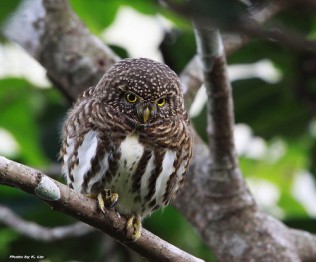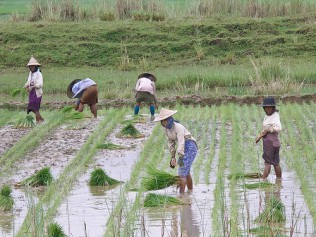The recent political opening of Burma (Myanmar) after decades of isolation is bringing new environmental challenges as the country struggles to modernize and develop its infrastructure and policy framework.
Due to its long isolation, Burma’s natural riches remain largely undeveloped. The country has huge swaths of intact forest and tremendous biodiversity, including 1,100 species of birds and a large population of Asian elephants (estimates range from 1,350 to 5,300 animals), as well as a population of 85 tigers, as an August 17 Science Magazine article notes. However, the poverty exacerbated by global economic sanctions has led to many environmentally destructive activities such as deforestation, illegal timber harvesting, poaching and illicit trade in wildlife and animal products. Rural residents have few incentives to adopt sustainable management practices since land and natural resources are owned by the state. Enforcement is a big problem; according to Science Magazine 14 of Burma’s 36 protected areas lack staff altogether, while the rest have too few rangers for effective patrolling and management.

Another consequence of Burma’s isolation is that the country’s infrastructure is extremely basic, with a dire need for new and better roads, rail networks, ports and shipping facilities, and as a recent article in The Diplomat notes. If not done carefully, the potential environmental impact from such construction, as well as from other activities such as mining, hydroelectric projects, the extraction of fossil fuels and large-scale agriculture, is substantial.
Compounding these problems is the fact that technical and professional expertise are often in short supply. There is also a lack of transparency and accountability in many government entities, including the state-owned Myanmar Oil and Gas Enterprise (MOGE), which recently offered 23 offshore oil and gas blocks for international exploration and development. During her landmark European tour in June, opposition leader and Nobel Peace Prize Winner Aung San Suu Kyi counseled foreign governments not to support investment in MOGE without requiring that the Burmese government adhere to internationally recognized codes of fiscal transparency. Nevertheless, a growing number of nations have lifted or eased sanctions to allow various kinds of investment in Burma, including in the oil and gas sector.
Some observers fear that the changing investment climate in Burma, combined with the lack of strong environmental regulations and enforcement mechanisms, will lead polluting industries in neighboring countries to move operations into Burma to escape tougher rules at home.
“The ‘development invasion’ will speed up environmental destruction and is also likely to lead to more human rights abuses. Industries will move very fast, while civil society is just beginning to learn about the impacts,” Pianporn Deetes of the US-based International Rivers Network told The Irawaddy Magazine.
The relaxing of sanctions also has implications for the logging industry. “After half a century of corruption and rule by the military and their business associates, Burma simply has no credible infrastructure through which we can verify the legality and sustainability of its timber exports,” said Faith Doherty, Head of Forests for the Environmental Investigation Agency, a London-based nongovernmental organization (NGO), in an April press release.
A 2011 report by the Burma Environment Working Group (BEWG), a coalition of 10 grassroots organizations, concluded: “Burma must have a sound policy framework for environmental protection and sustainable development that enables citizens to take part in decision making about their own development, and ensures responsible private sector investment. Until then, new foreign investors investing in energy, extractive and plantation sectors should refrain from investing.”

With sanctions being eased, the chances that international businesses will patiently wait for Burma to get its policies and democratic processes in order are slim. Yet despite the prevailing concerns, there are positive developments as well. In his inaugural address on March 30, 2011, Burmese President U Thein Sein pledged “serious attention” to environmental issues such as wildlife and habitat conservation, air and water pollution, industrial waste control, low-cost renewable energy, sustainable development and environmental law. Given the many issues at play in Burma, it remains unclear how much reliance should be placed on these promises; however, as Science Magazine reports, U Thein Sein’s government has taken a number of environmentally favorable steps, including halting the construction of a large Chinese-sponsored dam on the Irawaddy River, as well as canceling a major Thai project to build a coal-fired power plant on Burma’s southern coast. In addition, a Ministry of Mines decree issued in March 2012 banned mining within 100 meters of Burma’s four largest rivers. Earlier this year, Burma passed its first Environmental Conservation Law; widely criticized for being too weak, the law is currently undergoing revision and is expected to be ready by the end of 2012.
Another significant outcome of the recent political reforms is that NGOs can now register legally in Burma. This opens the door for civil society to take an active role in Burma’s future. One such local NGO (featured in the Science Magazine article) is Friends of Wildlife, which seeks to preserve Burma’s biodiversity. Run by a former forestry official and based in Yangon, Friends of Wildlife provides education and technical assistance to help local communities shift from slash-and-burn agriculture, hunting, and illegal logging to sustainable agriculture.
International organizations are also getting involved, from conservation groups such as the Wildlife Conservation Society and Panthera to agencies such as UNESCO, which recently pledged its commitment to assist Burma with the peace-making process and sustainable development, including preserving cultural heritage and supporting education and capacity-building in sectors such as water sanitation management and the media.
As the world gradually welcomes Burma back into the global fold, the challenges – economic, social, political, and environmental – facing the country are numerous, some might say daunting. But if the commitment to reform continues and the international community lends support rather than rushing in to rape and pillage, there is hope that conservation and sustainable development efforts can be successful.
“You are going back to Thailand in the 1950s with conservation practices of the 21st century, so there is a lot of opportunity to do it right,” Robert Tizard of the Wildlife Conservation Society’s Yangon office told The Irawaddy Magazine. “If they follow some of the best practices they could do incredibly well.”
Read Ethical Traveler's Reprint Policy.
